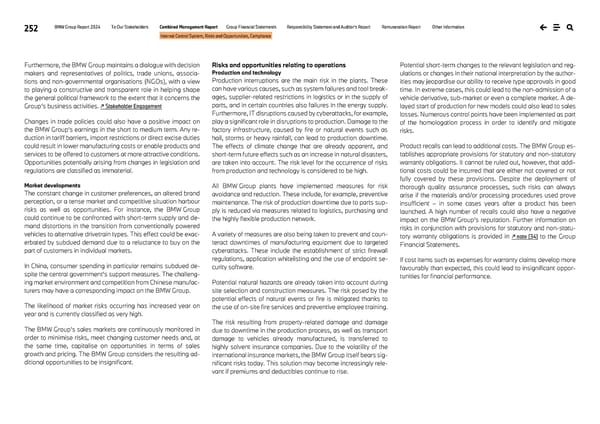252 BMW Group Report 2024 To Our Stakeholders Combined Management Report Group Financial Statements Responsibility Statement and Auditor’s Report Remuneration Report Other Information Internal Control System, Risks and Opportunities, Compliance Furthermore, the BMW Group maintains a dialogue with decision makers and representatives of politics, trade unions, associa- tions and non-governmental organisations (NGOs), with a view to playing a constructive and transparent role in helping shape the general political framework to the extent that it concerns the Group’s business activities. ↗ Stakeholder Engagement Changes in trade policies could also have a positive impact on the BMW Group’s earnings in the short to medium term. Any re- duction in tariff barriers, import restrictions or direct excise duties could result in lower manufacturing costs or enable products and services to be offered to customers at more attractive conditions. Opportunities potentially arising from changes in legislation and regulations are classified as immaterial. Market developments The constant change in customer preferences, an altered brand perception, or a tense market and competitive situation harbour risks as well as opportunities. For instance, the BMW Group could continue to be confronted with short-term supply and de- mand distortions in the transition from conventionally powered vehicles to alternative drivetrain types. This effect could be exac- erbated by subdued demand due to a reluctance to buy on the part of customers in individual markets. In China, consumer spending in particular remains subdued de- spite the central government’s support measures. The challeng- ing market environment and competition from Chinese manufac- turers may have a corresponding impact on the BMW Group. The likelihood of market risks occurring has increased year on year and is currently classified as very high. The BMW Group’s sales markets are continuously monitored in order to minimise risks, meet changing customer needs and, at the same time, capitalise on opportunities in terms of sales growth and pricing. The BMW Group considers the resulting ad- ditional opportunities to be insignificant. Risks and opportunities relating to operations Production and technology Production interruptions are the main risk in the plants. These can have various causes, such as system failures and tool break- ages, supplier-related restrictions in logistics or in the supply of parts, and in certain countries also failures in the energy supply. Furthermore, IT disruptions caused by cyberattacks, for example, play a significant role in disruptions to production. Damage to the factory infrastructure, caused by fire or natural events such as hail, storms or heavy rainfall, can lead to production downtime. The effects of climate change that are already apparent, and short-term future effects such as an increase in natural disasters, are taken into account. The risk level for the occurrence of risks from production and technology is considered to be high. All BMW Group plants have implemented measures for risk avoidance and reduction. These include, for example, preventive maintenance. The risk of production downtime due to parts sup- ply is reduced via measures related to logistics, purchasing and the highly flexible production network. A variety of measures are also being taken to prevent and coun- teract downtimes of manufacturing equipment due to targeted cyberattacks. These include the establishment of strict firewall regulations, application whitelisting and the use of endpoint se- curity software. Potential natural hazards are already taken into account during site selection and construction measures. The risk posed by the potential effects of natural events or fire is mitigated thanks to the use of on-site fire services and preventive employee training. The risk resulting from property-related damage and damage due to downtime in the production process, as well as transport damage to vehicles already manufactured, is transferred to highly solvent insurance companies. Due to the volatility of the international insurance markets, the BMW Group itself bears sig- nificant risks today. This solution may become increasingly rele- vant if premiums and deductibles continue to rise. Potential short-term changes to the relevant legislation and reg- ulations or changes in their national interpretation by the author- ities may jeopardise our ability to receive type approvals in good time. In extreme cases, this could lead to the non-admission of a vehicle derivative, sub-market or even a complete market. A de- layed start of production for new models could also lead to sales losses. Numerous control points have been implemented as part of the homologation process in order to identify and mitigate risks. Product recalls can lead to additional costs. The BMW Group es- tablishes appropriate provisions for statutory and non-statutory warranty obligations. It cannot be ruled out, however, that addi- tional costs could be incurred that are either not covered or not fully covered by these provisions. Despite the deployment of thorough quality assurance processes, such risks can always arise if the materials and/or processing procedures used prove insufficient – in some cases years after a product has been launched. A high number of recalls could also have a negative impact on the BMW Group’s reputation. Further information on risks in conjunction with provisions for statutory and non-statu- tory warranty obligations is provided in ↗ note [34] to the Group Financial Statements. If cost items such as expenses for warranty claims develop more favourably than expected, this could lead to insignificant oppor- tunities for financial performance.
 BMW Group Report 2024 Page 251 Page 253
BMW Group Report 2024 Page 251 Page 253